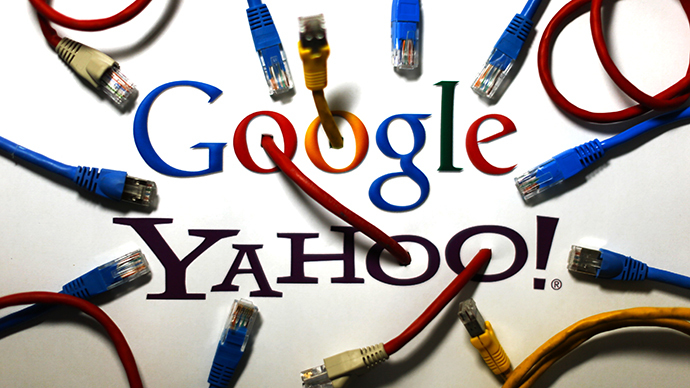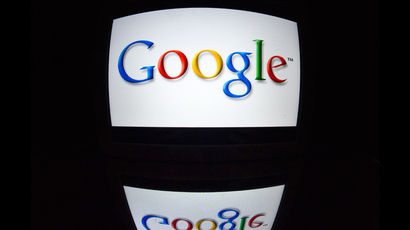Internet giants to government: We can spy on customers’ data, you shouldn’t

Silicon Valley has been largely speaking out as of late against the United States government’s controversial surveillance programs, but some say the nation’s top cyber firms are scared that their own abilities to collect info could soon be eroded.
Months into the ongoing and always heated debate about the US National Security Agency’s spy operations, President Barack Obama said last December that he had appointed a small panel of experts to assess the NSA programs in question that had been exposed after former contractor Edward Snowden started to disclose classified documents earlier that year. That review group has since presented a few dozen recommendations to the White House, and last month Pres. Obama asked Congress to codify into law changes concerning the way that the US government gets access to certain sensitive records — namely the telephony metadata created by telecommunication companies and currently gathered in bulk by the NSA, as exposed by Mr. Snowden.
In January, however, the president also said a separate group would reach out to privacy experts, technologists and business leaders to inspect the way that “big data” is created, collected and used by both the public and private sector, and “whether we can forge international norms on how to manage this data and how we can continue to promote the free flow of information in ways that are consistent with both privacy and security.”
Ultimately, Obama said at the time, “[W]hat’s at stake in this debate goes far beyond a few months of headlines or passing tensions in our foreign policy.”
Now this week in the National Journal, reporter Brendan Sasso writes that “Google is getting nervous” over what the president had to say.
“On the one hand, the Internet behemoth wants the public to know it’s outraged by US surveillance programs and is aggressively lobbying for new rules to keep its customers’ data safe from the government’s prying eyes,” Sasso wrote. “But as public attention turns to data privacy, Google, Facebook, Yahoo and other tech giants want to be sure that their own data-gathering practices don’t get lumped in with the federal spying programs that are the target of popular ire.”
Indeed, the giants of Silicon Valley — even some of the ones implicated in certain NSA spy programs, according to Snowden’s leaks — have spoken up about alleged counterterrorism intelligence-gathering practices perpetrated by the NSA that routinely sacrifice the privacy of the world’s wired population in exchange for supposed national security for some. At the same time, however, some — including Google — have earned reputations for not exactly valuing customer data as being something sacred or sensitive. In court documents filed by the search engine giant last year surrounding a class action lawsuit concerning the company’s automated scanning of messages sent through its Gmail service, Google said “Indeed, 'a person has no legitimate expectation of privacy in information he voluntarily turns over to third parties.’" And while the CEO of Facebook may have recently lashed out publically at Pres. Obama over the NSA’s activities, the social networking site has been scrutinized heavily over their own issues regarding privacy in the past, and just this year were sued for allegedly monitoring its user’s private messages.
When leaked NSA documents suggested last year that the US had been tapping into information sent between Google’s datacenters in an unencrypted state, however, the search company’s executive chairman, Eric Schmidt, said it was “outrageous.” Then when disclosure made last month accused the NSA of masquerading as Facebook in order to trick targets and take over their computers, CEO Mark Zuckerberg said he was “confused and frustrated by . . . the behavior of the US government.” Another remark made by the social networking star in a statement published last month — that “The US government should be the champion for the internet, not a threat”—was all but echoed by other leading websites and tech experts who blamed the country’s behavior for undermining the very infrastructure of the ‘net.
But with “big data” being brought into the Obama administration’s crosshairs too now, Sasso says those same companies are saying “Leave us out of your spying fight.” And some, he added for an article published by the Journal on Tuesday this week, say there is “widespread frustration with the White House” because of both big data and the NSA’s operations being examined at once.
“Companies have very specific relationships with their users, and they tell them what they’re doing with their data,” one unnamed technology industry lobbyist said to Sasso.
On his part, Sasso succinctly summarized the difference between the public and private sector’s information gathering in just two sentences:
“Tech companies are lobbying against NSA spying because they worry it could undermine trust in their services,” he said. “But they depend on the ability to harvest data about users to target advertising and to provide other services,”
John Podesta — the Obama administration counselor tasked by the president in January to review big data technologies — said during an address at University of California-Berkley this month that “Big Data requires us to ask ourselves, how do we embrace new technologies and the progress they bring to our society, while at the same time protecting our fundamental freedoms and values, like privacy, fairness and self-determination?”
“[T]he legal and policy questions that these technologies raise are quite old,” Berkley’s newspaper quoted Podesta as saying.
“In the midst of what some are calling a Big Data revolution,” he said, “we’re taking this opportunity to consider the landscape, and to really interrogate whether our existing policies are prepared for what’s on the horizon technologically.”
Now according to Sasso, Silicon Valley is shaking because — despite being assured by his anonymous tech source that comparing the NSA with big data is on par with assessing “apples and oranges”— the cyber companies that collect personal information for reasons other than alleged national security could soon lose their ability to harvest data as well.














